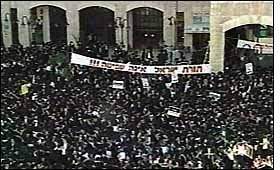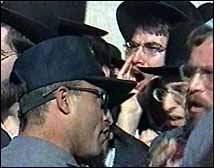Jerusalem, 14 February 1999.
 Over 500,000 Jews crowded the streets of Jerusalem this sunny
Sunday afternoon, to protest against the recent anti-Jewish
rulings of the Israeli Supreme Court.
Over 500,000 Jews crowded the streets of Jerusalem this sunny
Sunday afternoon, to protest against the recent anti-Jewish
rulings of the Israeli Supreme Court.
Media estimates of the attendance at the rally this afternoon in Jerusalem vary from 250,000 to 600,000. A police helicopter reported over 500,000
people at the site. Religious Jews of all streams heeded the calls of their
 spiritual leaders and arrived in buses from all over the country.
spiritual leaders and arrived in buses from all over the country.
Similar prayer vigils were held at the same time in New York, London, Antwerp, Paris, and other Jewish communities around the world.
 Posters at the mass gathering read, "The Torah of Israel is not adjudicatable", a reference to Chief Justice Barak's statements
saying that "everything is subject to adjudication."
Other banners read, "The Supreme Court is tearing the nation apart,"
and "This Torah will never be replaced."
Posters at the mass gathering read, "The Torah of Israel is not adjudicatable", a reference to Chief Justice Barak's statements
saying that "everything is subject to adjudication."
Other banners read, "The Supreme Court is tearing the nation apart,"
and "This Torah will never be replaced."
Media commentators noted the unprecedented discipline and orderliness of such a large crowd, as well as the significant and unusual measure of cooperation among the various religious and nationalistic camps in organizing the event.
Over half a million people were there. This was an event involving over ten percent of Israel's Jewish population!!!
During the past year, the Supreme Court has made several rulings that were defined by the Jewish religious leaders as anti-Jewish. They include rulings about kashrut, Jewish burials, Jewish education, Jewish marriage and divorce, and about restricting political activity by Rabbis.
Some of the more controversial rulings involve acceptance of Reform conversions by the State of Israel, and forcing the Orthodox religious councils to include Conservative and Reform members. This despite previous agreements that had been reached by these movements.
Rabbis say that the secular Israeli Supreme Court should not involve itself in rulings concerning traditional Jewish Law. Furthermore, the Supreme Court should limit itself to interpret the laws accepted by the Knesset, the Israeli Parliament, and not to invent its own laws.
Nevertheless, the protest was probably caused in reaction to anti-semitic statements made by Beersheba Magistrate's Court Judge Oded Alyagon, who refered to religious Jews as "lice" and "parasites." Supreme Court President Aharon Barak reportedly shook Alyagon's hand afterwards and said to him: "well spoken."
Rabbi Simcha HaCohen Kook, the long-time Chief Rabbi of Rehovot called for a "peaceful" demonstration, and for dialogue between the camps. Rabbi Kook added: "As usual, the media are portraying the event falsely. It's not a demonstration against democracy, it is simply a prayer service, and there will be no speeches... I do not want to risk a police investigation, so allow me to simply quote former Supreme Court Chief Justice Moshe Landau, who wrote in a Haifa University Law journal that the way of the current Supreme Court in this term is not democratic, and that the Court has taken upon itself the authorities of the Knesset. Other prominent judges have also expressed similar harsh criticism... This is a dangerous situation, therefore, that imperils not only the religious, but the entire society... There is no other country in the world that would have allowed a judge who called an entire sector "lice" and "parasites" to continue to serve as a judge." [President of the Southern District Courts, Justice Oded Alyagon, called the hareidi community "parasites" in August 1996.]
Prime Minister Netanyahu met with leading judicial-system representatives and religious public leaders, in an attempt to establish a national forum for discussing religion-and-state issues. He said: "For the Jewish people, nationality and religion are intertwined, and it is impossible to define the Jewish people by completely separating its national identity from its religious identity."
Former Supreme Court justice Tzvi Tal: "There is room for the Supreme Court to make an 'accounting' regarding its sensitivity to Jewish tradition and that which is holy to it. When the Court must decide between individual civil rights and Jewish values, the former has until now been given the upper hand. This should not be so in a Jewish state... When the Declaration of Independence states that Israel will be a Jewish and democratic state, the intention was not that 'Jewish' should trail behind 'democratic,' but rather that both values should be equal in importance... Judges who have not been trained in Torah cannot be sufficiently attuned to the central importance of the Jewish roots. They relate to the religious values as a social phenomenon that can be either accepted or rejected... "
The sensation at the rally was one of positive pride and satisfaction. At the conclusion of the rally in Jerusalem, thousands of religious and secular people, gathered in groups and held discussions on the issues of democracy and religious rights.
Chief Rabbi Yisrael Meir Lau, a survivor of the Nazi Holocaust, called for Jewish Unity and wept while talking about religious divisions in Israel during an interview broadcast in Israeli Television on Monday, after Jews protested in Jerusalem against alleged religious persecution by Israel's Supreme Court. "Let's sit down together, let's live together. We always knew how to die together. The time has come for us to know also how to live together," Rabbi Lau said before breaking down in tears during the interview.
"I'm sorry. It's an awfully hard day for me," said Rabbi Lau, who has worked to bridge the gaps between Israel's secular and religious communities. He appealed to the Knesset, Israel's parliament, to enact legislation so the courts would not feel compelled to act on religious issues. "When did Israel's Knesset, which turned 50 years old two weeks ago, sit to discuss for an entire week who we are, what a Jewish state is, what is the meaning of the proclamation of independence?" Rabbi Lau said. "Why leave all of this niche to the court?"
MK Chanan Porat, Chairman of the Knesset Law Committee, said: "The main objective is unity within the nation. It is important that this be done in a way that also brings in the sector that is defined as non-religious."